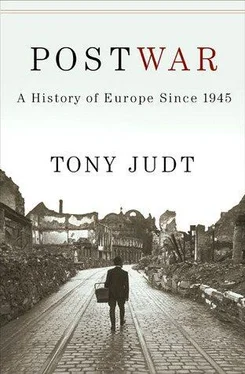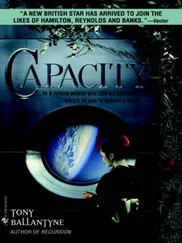The IRO, too, was largely funded from the Western allied powers. In its first (1947) budget the United States’ share was 46 percent, rising to 60 percent by 1949; the United Kingdom contributed 15 percent, France 4 percent. Because of disagreement between the Western allies and the Soviet Union over the issue of forced repatriations, the IRO was always regarded by the USSR (and later by the Soviet bloc) as a purely Western instrument and its services were thus confined to refugees in areas controlled by Western armies of occupation. Moreover, since it was devoted to servicing the needs of refugees, German displaced persons were also debarred from its benefits.
This distinction between displaced persons (assumed to have, somewhere, a home to go to) and refugees (who were classified as homeless) was just one of many nuances that were introduced in these years. People were treated differently depending on whether they were nationals of a wartime ally (Czechoslovakia, Poland, Belgium, etc) or a former enemy state (Germany, Romania, Hungary, Bulgaria, etc). This distinction was also invoked when establishing priorities for the repatriation of refugees. The first to be processed and sent home were UN nationals liberated from concentration camps; then came UN nationals who had been prisoners of war, followed by UN nationals who were displaced persons (former forced labourers in many cases), then displaced persons from Italy and finally the nationals of former enemy states. Germans were to be left in place and absorbed locally.
Returning French, Belgian, Dutch, British or Italian citizens to their country of origin was relatively straightforward and the only impediments were logistic: determining who had a right to go where and finding enough trains to take them there. By June 18th 1945, all but 40,550 of the 1.2 million French nationals found in Germany at the surrender a month earlier were back in France. Italians had to wait longer, as former enemy nationals and because the Italian government had no coordinated plan to repatriate its citizens. But even they were all home by 1947. In the east, however, there were two significant complications. Some displaced persons from eastern Europe were technically stateless and had no country to which to return. And many of them had no wish to go home. This puzzled Western administrators at first. Under an agreement signed at Halle, in Germany, in May 1945 all former prisoners of war and other citizens of the Soviet Union were to return home, and it was assumed that they would wish to do so. There was one exception: the western Allies did not recognize Stalin’s wartime absorption of the Baltic states into the USSR and Estonians, Latvians and Lithuanians in displaced persons camps in the western zones of Germany and Austria were therefore to be given the option of returning east or finding new homes in the West.
But it was not just the Balts who did not wish to go back. A large number of former Soviet, Polish, Romanian and Yugoslav citizens also preferred to remain in temporary camps in Germany rather than return to their countries. In the case of Soviet citizens this reluctance often arose from a well-founded fear of reprisals against anyone who had spent time in the West, even if that time had been passed in a prison camp. In the case of Balts, Ukrainians, Croats and others there was a reluctance to return to countries now under Communist control in fact if not yet in name: in many cases this reluctance was prompted by fear of retribution for real or imputed war crimes, but it was also driven by a simple desire to escape west into a better life.
Throughout 1945 and 1946 Western authorities preferred to ignore such feelings on the whole and oblige Soviet and other east European citizens to return home, sometimes by force. With Soviet officials actively rounding up their own people from German camps, refugees from the East sought desperately to convince bemused French, American or British officials that they did not want to return ‘home’ and would rather stay in Germany—of all places. They were not always successful: between 1945 and 1947, 2,272,000 Soviet citizens were returned by the Western Allies.
There were terrible scenes of desperate struggle, particularly in the early postwar months, as Russian émigrés who had never been Soviet citizens, Ukrainian partisans and many others were rounded up by British or American troops and pushed—sometimes literally—across the border into the arms of the waiting NKVD. [8] At the end of May 1945 the British Army turned over to Yugoslav authorities 10,000 Slovenian soldiers and civilians who had fled to Austria. Most of them were trucked south to the Kocevje forests and summarily shot.
Once in Soviet hands they joined hundreds of thousands of other repatriated Soviet nationals, as well as Hungarians, Germans and other former enemies deported east by the Red Army. By 1953 a total of five and a half million Sovietnationals had been repatriated. One in five of them ended up shot or dispatched to the Gulag. Many more were sent directly into Siberian exile or else assigned to labour battalions.
Only in 1947 did forced repatriation cease, with the onset of the Cold War and a new willingness to treat displaced persons from the Soviet bloc as political refugees (the 50,000 Czech nationals still in Germany and Austria at the time of the February 1948 Communist coup in Prague were immediately accorded this status). A total of one and a half million Poles, Hungarians, Bulgarians, Romanians, Yugoslavs, Soviet nationals and Jews thus successfully resisted repatriation. Together with Balts these formed the overwhelming majority of displaced persons left in the western zones of Germany and Austria, and in Italy. In 1951 the European Convention on Human Rights would codify the protection to which such displaced aliens were entitled, and finally guarantee them against forcible return to persecution.
The question remained, however: what was to become of them? The refugees and DPs themselves were in no doubt. In the words of Genêt (Janet Flanner), writing in The New Yorker in October 1948, ‘[The displaced persons] are willing to go anywhere on earth except home.’ But who would take them? West European states, short of labour and in the midst of economic and material reconstruction, were initially quite open to importing certain categories of stateless person. Belgium, France and Britain especially needed coalminers, construction workers and agricultural labourers. In 1946-47 Belgium took in 22,000 displaced persons (along with their families) to work in the mines of Wallonia. France took in 38,000 people for manual employment of various kinds. Britain took 86,000 persons in this way, including many veterans of the Polish army and Ukrainians who had fought in the Waffen SS ‘Halychnya’ Division. [9] The Halychnya or Galician Division of the Waffen SS was made up of Ukrainians who had been citizens of inter-war Poland and whose region of origin was incorporated into the USSR after the war. They were thus not repatriated to the Soviet Union, despite having fought against it alongside the Wehrmacht, and were treated by Western authorities as stateless persons.
The criteria for admission were simple—western European states were interested in strong (male) manual workers, and were not embarrassed to favour Balts, Poles and Ukrainians on those grounds, whatever their wartime record. Single women were welcome as manual workers or domestics—but the Canadian Labor Department in 1948 rejected girls and women applying to emigrate to Canada for jobs in domestic service if there was any sign that they had education beyond secondary school. And no-one wanted older people, orphans or single women with children. Refugees in general, then, were not met with open arms—post-war polls in the US and western Europe revealed very little sympathy for their plight. Most people expressed a desire to see immigration reduced rather than increased.
Читать дальше












